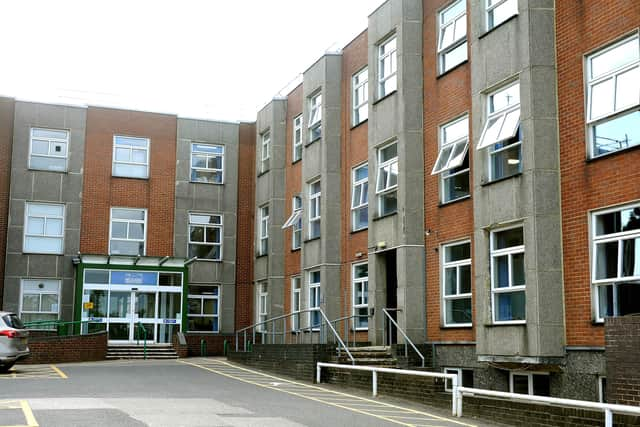Mid Sussex councillors sign off budget and council tax increase
and live on Freeview channel 276
During a meeting of the full council on Wednesday (March 3), members also agreed to raise the district’s portion of the Band D council tax bill by £4.95 for the year, taking it to £175.41.
The pandemic has hit all local councils hard – and will continue to do so for years – and leader Jonathan Ash-Edwards gave a blunt appraisal of the situation in Mid Sussex
Advertisement
Hide AdAdvertisement
Hide AdHe said: “The council’s finances are not on a sustainable footing over the medium term.


“Unless there is a significant and quick bounce-back in the economy and income that the council receives, and a reduction in costs – neither of which at this stage should be taken for granted or assumed – the council’s reserves will reach a perilous position within the next four years.
“We cannot allow that to happen and will need to take corrective action over the coming couple of years.
“A failure to do so will mean the council will not be able to continue providing the kinds of services and pursuing the kinds of projects that we do on behalf of our communities.”
Advertisement
Hide AdAdvertisement
Hide AdThe net revenue budget for 2021/22 – the amount needed for the day-to-day running of the council and its services – stands at £17.637m.
This is a rise of £3m compared to 2020/21.
Mr Ash-Edwards told the meeting that the draw on reserves would have been even higher had it not been for a ‘windfall’ in the form of business rates retention as a result of the Rampion Wind Farm development.
Looking to the future, he said it was too early to know what the long-term financial impact of the pandemic would be or when the costs to the council would subside.
Of course, the council has not had the monopoly on financial woes this past year, with business after business struggling or even going under, taking jobs and livelihoods with them.
As such, economic recovery is now high on the ‘to do’ list.
Advertisement
Hide AdAdvertisement
Hide AdMr Ash-Edwards said: “This must be our overriding priority and one on which we must not be neutral.
“We must focus our efforts on supporting local businesses and jobs and ensuring Mid Sussex continues to be a great place to work and run a business.”
An amendment to the budget tabled by Simon Hicks (Lib Dem, Burgess Hill – Leylands) called on Mr Ash-Edwards to write to the government to ask for an urgent review of the council tax system.
Mr Hicks called the system ‘out of date and often arbitrary and regressive’ and said the various Bands needed to ‘better reflect people’s ability to pay the tax’.
The amendment was voted down.
Advertisement
Hide AdAdvertisement
Hide AdAfter the meeting, Mr Hicks said: “It is vital that local services are properly funded yet council tax is out of date and unfair. It is the ‘not quite poor’ who suffer the most, those who have enough income that means they don’t qualify for benefits but get hit by above inflation council tax increases.”
He pointed out how the total cost of council services levied by all authorities is equivalent to more than a third of what the average person employed in Mid Sussex pays in income tax. Two low earners in a single household can often end up paying more in council tax than they pay in income tax.
The level of tax is determined by tax bands which are still based on property values from April 1991 – almost 30 years ago.
Meanwhile Mr Ash-Edwards said: “The Corporate Plan and Budget for 2021/22 sets out how we will start the critical task of rebuilding the council’s finances after the impact of the pandemic. Our overriding priority is to support the recovery of our local economy, protecting local businesses and retaining local jobs.
Advertisement
Hide AdAdvertisement
Hide Ad“With so many people currently working from home, the importance of fast and stable digital connections has never been more obvious, and we will continue to expand our Gigabit capable Full Fibre network this year. We are currently rolling out 2,500 metres of Full Fibre every week and as we connect the district up like never before, there will be significant opportunities for local businesses to innovate and grow.
“We will be redesigning our waste and recycling service this year, introducing kerbside food waste collections, which is possibly the single biggest environmental benefit we can bring about as a district council.
“Finally, supporting vulnerable people has never been more important and one of the most acute challenges facing our communities is the number of people who are sadly living in emergency accommodation. Over the next year, our single biggest capital investment will be in more affordable and temporary accommodation to support our residents.
“It has been a tough year for everyone, but the national vaccination programme gives us hope for a better future. The latest NHS data shows that over 42,000 Mid Sussex residents have now had their first jab, which is excellent news.
Advertisement
Hide AdAdvertisement
Hide Ad“The planned reopening of our economy and the lifting of social restrictions over the next few months provides significant light at the end of the tunnel.
“We may have a long road ahead of us, but we will recover from the impact of Covid-19 and, as a council we will work hard to ensure Mid Sussex continues to be a great place to work and live.”